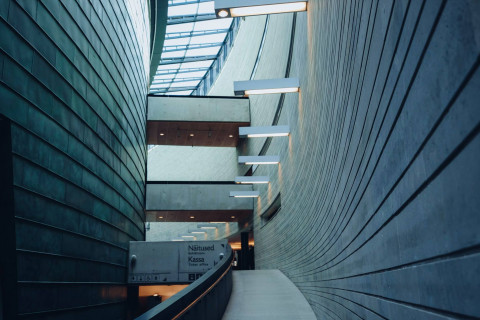
foto: KUMU
On 13 August at 4 pm a virtual discussion on the topic “Potentials of political curating during crises” will take place. The event is part of the official finissage of the Kumu Art Museum’s exhibition “Thinking Pictures”.
The discussion will be moderated by the art historian and cultural theorist Margaret Tali and will be held in English. The following experts have been invited to participate: Francisco Martinez, anthropologist and project leader in social design at the Estonian Academy of Arts; Inga Lāce, C-MAP Central and Eastern Europe Fellow at the Museum of Modern Art; Lia Dostlieva, a Ukrainian artist, essayist, cultural anthropologist and a researcher at Adam Mickiewicz University in Poznań, Poland, and Joanna Warsza, curator and Program Director at CuratorLab at Konstfack University of Arts, Crafts and Design.
The talk will take place via the Teams platform. You can join the conversation here: https://bit.ly/potentials-of-curating
Whereas political curating has operated on the periphery of art, the war in Eastern Europe and other emergencies require new ways of approaching art in different institutions across the art field. Focusing on discussion between the participants and the audience, this round-table with professional curators will discuss the potentials for curatorial work during the international crises to which the war in Ukraine has led. Decolonial approaches to the post-socialist region have started to receive increasing public attention recently in the light of this war. However, what exactly could decolonisation mean in this region is still unclear. How can curating contribute to these debates, to the cultural field and to society in the context of war? What kind of strategies have curators and cultural organisations found for dealing with art and collaborating with artists in this sensitive context? What kinds of collaborations do we need in the cultural field to tackle sensitive subjects productively?
The focus of the research exhibition Thinking Pictures, which was prepared in cooperation with the Zimmerli Art Museum in the United States since 2016, was supposed to be a dialogue between Baltic and Moscow artists in the 1970s and 1980s. A few weeks before the opening of the exhibition, Russia started a war against Ukraine, and the dialogue on recent history acquired an entirely new context. As of the second half of April, the exhibition that initially opened in the Kumu Great Hall devoid of any artworks as an anti-war protest has been gradually filled with works. Every few weeks, an artwork or series of works was added to each thematic space, which revealed the essence of the topic or establish a dialogue with the existing works. Through this approach, the museum wished to pose questions about the most recent current events and contribute to the debate on the role of culture in this critical situation.